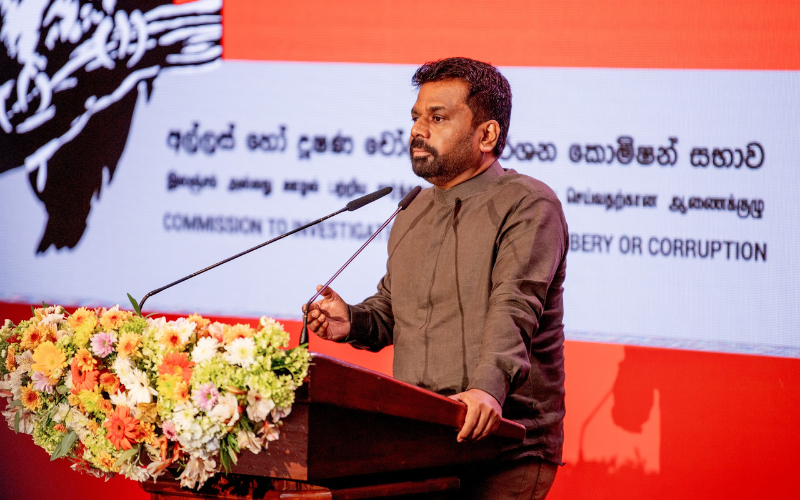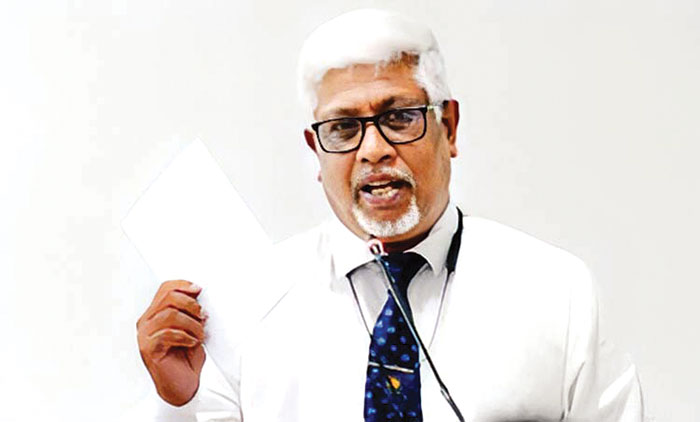News
Whereabouts of NTJ bomber Hastun’s wife still a mystery

Outgoing HR Chief says missing girl’s mother never mentioned Zahran
By Shamindra Ferdinando
The Human Rights Commission of Sri Lanka (HRCSL) said Rajaratnam Kavitha, mother of P. Pulasthini (24) wife of Thowheed Jamaat suicide bomber Atchchi Muhammadu Hastun hadn’t informed the HRCSL Office in Batticaloa of Zahran Hashim’s involvement in the disappearance of her daughter.
Outgoing HRCSL Chairperson Dr. Deepika Udagama told The Island that there hadn’t been any reference to Zahran when Kavitha visited the Regional Office on April 17, 2019, four days before the Easter attacks.
Dr. Udagama was responding to The Island query whether the Regional Office informed Colombo of receiving a complaint as regards the missing young woman. The Island raised the issue with Dr. Udagama in the wake of Kavitha‘s testimony before the Presidential Commission of Inquiry (P CoI) in late last month.
Kavitha said that she visited the HRCSL Regional Office in Batticaloa after the Kaluwanchikudy and Kattankudy Police stations declined to accept her complaints. Kavitha said: I informed an officer there that I had found out my daughter was with Zahran. At that moment he said he knew Zahran and that there was nothing to be scared of since Zahran was a normal person.” Kavitha also quoted the HRCSL official as having said there was no need to lodge a complaint and that he would look into the matter.
The PCoI was told that Pulasthini fled to India following the blast. Intelligence services are in the process of verifying controversial testimony before the PCoI. However, authorities are yet to reach a conclusion on Pulasthini’s whereabouts against the backdrop of initial reports she perished in
Sainthamaruthu blast that claimed the lives of several Thowheed Jamaat cadres.
Q: Did HRCSL receive a complaint in this regard or any information regarding Kavitha’s visit to HRCSL Regional Office?
A: We obtained a detailed report on the matter from our Batticaloa Regional Office. It also includes the log entry relating to the visit of Ms. Kavitha to the Regional Office on 17 April, 2020. According to our records, one Ms. Kavitha of Mankadu, Cettipalayam had visited our Batticaloa Regional Office on 17 April, 2019 accompanied by a male. Her complaint was that her daughter P. Pulasthini (age 24) had gone away with a young man from the Muslim community and had married him in 2015, and that her whereabouts were not known. She had appealed to the HRCSL to assist in finding her. As the matter was of a private nature, our officer had informed Ms. Kavitha that it did not fall within the HRCSL’s statutory mandate. Ms. Kavitha had been advised to seek the assistance of the police to find her daughter. At that point the mother had not informed of any attempts to complain to the police or of any inaction on the part of the police. If that were the case the complaint would have been registered.
In her complaint Ms. Kavitha had stated that one Razik from a Muslim organization was having influence over her daughter’s family life. There had been no mention of a Zahran. In fact, as a gesture of assistance our officer had called a telephone number provided by Ms. Kavitha which was said to be that of Razik. He had denied knowledge of Pulasthini’s whereabouts and had mentioned that the parents had complained to Maligawatta police station about the matter and that the police including CID had questioned him in that regard. As there was nothing out of the ordinary about the complaint, the HRCSL Colombo had not been informed. That is the regular procedure.
Q: Did PCoI ask HRCSL personnel to appear before it? And if not, will you be inquiring into this (in the wake of PCoI revelation.
A: No, we have not been summoned by the PCoI. The records from our Batticaloa office, in our opinion, do not give rise to any issue that requires further investigation.
Q: Did HRCSL inquire into Easter Sunday tragedy or receive complaints as regards the government’s failure to thwart the carnage?
A: Even in the absence of a complaint, the HRCSL could investigate this matter on its own initiative (per S.14 of HRCSL Act, No 21 of 1996). However, we are aware that the same issue is being canvassed before the Supreme Court via FR petition by at least one aggrieved party. When a matter is canvassed before the Supreme Court in a FR application, the Commission does not conduct a parallel inquiry. The decision of the SC is binding on all parties.
Pulasthini’s husband carried out the attack on St. Sebastian church, Katuwapitiya where over 100 people perished.
Dr. Udagama confirmed the announcement made by the Constitutional Council on Monday (3) regarding her decision to quit the post. Head of Department of Law Faculty of University of Peradeniya, Dr. Udagama received the appointment in Oct 2015.
The Constitutional Council said that Dr. Udagama tendered her resignation from the post of chairperson of the Human Rights Commission of Sri Lanka with effect from September 2020.
The CC Chairman informed the Constitutional Council that the Human Rights Commission was rated as one of the best in the world and that he would like to convey the appreciation to its Chairman Dr Udagama and the members of the commission for the exceptional achievement.
Latest News
Enforcing the law against bribery and corruption is not an act of political revenge but a profound human responsibility – President

President Anura Kumara Disanayake emphasized that since assuming office, the current government has taken decisive steps to free the process of combating bribery and corruption from political interference. He reiterated that while the political mechanism has been liberated from engaging in such crimes, it is now the responsibility of the administrative machinery operating beneath that political structure to fall in line and correct its course without delay.
He explained that a grace period of six months has already been provided for the state officials to adjust to this new direction. The President firmly warned that if the public service mechanism fails to act appropriately within this period, the government will not hesitate to take firm legal action against those officials from May onwards.
President Disanayake expressed these views on Wednesday (09), participating in the launch of the National Anti-Corruption Action Plan 2025–2029, held at the Bandaranaike Memorial International Conference Hall (BMICH) in Colombo.
Bribery and corruption have proliferated, undermining the integrity and values of the country’s state institutions .He observed that over the past six months of the present government, no section of the public service has been allowed to collapse and that if officials continue to resist change, the government will proceed to remove and replace them after May.
The President pointed out that bribery and corruption have caused the nation to fall behind for decades in the eyes of the world. He reiterated that enforcing the law against these crimes is not an act of political revenge but a profound human responsibility.
The President stressed the need to build a society that respects the law and fears wrongdoing, adding that conducting lectures or workshops alone would not suffice in achieving this goal. He emphasised that people must practically witness that any person who commits a crime will be subjected to punishment under the law.
President Disanayake noted that corruption in Sri Lanka ranges from minor bribery, from the village level to bringing poor quality medicinal drugs. Bribery and corruption have escalated from minor instances to grave financial crimes, extending from local councils to looting the Central Bank.
The President further said that previous rulers safeguarded and protected those engaged in corrupt activities.
He also revealed the emergence of a network of thieves within several state administrative institutions and certain bodies responsible for enforcing the law, comprising underworld elements involved in bribery and corruption. He confirmed that these criminal networks have already been identified and assured that measures will be implemented in the future to dismantle and eliminate them.
President Disanayake solemnly pledged that the responsibility of eradicating bribery and corruption will not be passed on to the next generation but will be resolved within this generation itself, under the leadership of the present government.
Drawing a comparison with India, which gained independence a year before Sri Lanka, the President noted that through a consistent national policy framework, India has successfully achieved space exploration and built a massive workforce in the software industry. In stark contrast, he pointed out that Sri Lanka, due to poor decisions made by its political leadership, was declared a bankrupt state in 2022.
He further stated that the current government has taken on the responsibility of leading Sri Lanka towards the international stage through a national policy framework that ensures transparency and accountability for every rupee spent from public funds.
The President added that by implementing this framework, it is possible to build public trust in law enforcement and judicial institutions and that it must be made clear to the people that there will be no mechanism available for anyone to escape the law after committing a crime.
He stated that the purpose of the National Anti-Corruption Action Plan 2025-2029 is to guide the country towards becoming a nation of integrity. The government plans to establish Internal Affairs Unit within all state institutions including the Presidential Secretariat and implement a system for monitoring these units through digital technology to ensure accountability and transparency.
The Action Plan has been designed around four key strategic priority areas: prevention and public participation, institutional strengthening and the enforcement of law along with reforms in law and policy.
The President highlighted that eliminating bribery and corruption is one of the most decisive factors in a country’s development and progress. In Sri Lanka, the Commission to Investigate Allegations of Bribery or Corruption (CIABOC) has been identified as the leading state institution entrusted with strengthening this mechanism. Accordingly, it was recognised that a robust national anti-corruption policy that operates across all sectors is essential to creating a corruption-free society.
In preparing this Action Plan, CIABOC engaged all relevant stakeholders by conducting extensive programmes at both national and provincial levels. A broad public consultation process was carried out, including a comprehensive survey to assess public opinion on corruption through media announcements in all three languages and via social media networks.
This process gathered proposals from a diverse range of participants, including Members of Parliament, judges, state officials, the private sector, international organisations, civil society organisations, community-based organisations, religious groups, persons with special needs, media professionals, youth, children and the general public. Additionally, foreign state experiences and suggestions from various groups across all provinces were taken into consideration when formulating the Action Plan.
By implementing this National Anti-Corruption Action Plan, the government hopes to foster a committed citizenry determined to combat corruption, a political will fully supportive of this effort, a comprehensive legal framework and a disciplined, transparent public service across all sectors, with the shared vision of building a country of integrity for future generations.
Addressing the event, the Japanese Ambassador to Sri Lanka, Hideaki Mizukoshi, stated that Corruption remains a great challenge for many countries, including Sri Lanka as it undermines economic growth, weakens public trust in government institutions and discourages foreign investment. However, he noted that due to the reform initiatives of the present government, investors are once again showing increasing interest in Sri Lanka.
Ambassador Mizukoshi further stated that Japan has always believed that transparency and good governance are fundamental pillars for sustainable economic development and therefore, has supported anti-corruption initiatives globally for over a decade.
Meanwhile, the UNDP Resident Representative in Sri Lanka, Ms. Azusa Kubota, stated that according to Sri Lanka’s first-ever National Taxpayer Perception Survey conducted last year, 84% of respondents indicated that corruption directly affects their willingness to pay taxes.
She further noted that corruption deters investment, increases the cost of doing business, undermines sustainable development and human security, and causes an estimated annual loss of USD 1.3 trillion for developing countries.
Referring to the Budget Speech delivered by the President, Ms. Kubota emphasised that the State must be accountable for every cent of taxpayers’ money and stated that this Action Plan would serve as a roadmap for transforming Sri Lankan society.
The event was attended by the Chief Justice, Supreme Court Justice Murdu Nirupa Bidushinie Fernando; the Attorney General, Parinda Ranasinghe PC; the Secretary to the President, Dr. Nandika Sanath Kumanayake; the Chairman of CIABOC, former High Court Judge Neil Iddawela; the Director General of CIABOC, R.S.A. Dissanayake; the Commanders of the Tri-Forces; the Inspector General of Police; senior officials from the security forces and a large number of state officials.
Latest News
Sun directly overhead Hatthikuchchi, Kalankuttiya, Halmillewa, Ipalogama, Palugaswewa and Habarana at about 12:11 noon. today [10]

On the apparent northward relative motion of the sun, it is going to be directly over the latitudes of Sri Lanka during 05th to 14th of April in this year.
The nearest areas of Sri Lanka over which the sun is overhead today (10th) are Hatthikuchchi, Kalankuttiya, Halmillewa, Ipalogama, Palugaswewa and Habarana at about 12:11 noon.
News
LG elections to be staggered

Signs are clear that the local government (LG) elections, originally scheduled for 06 May, will have to be held on a staggered basis, as nomination lists in respect of about 200 out of 339 LG institutions have been challenged before the Court of Appeal, according to sources.
Those who have filed cases in the Court of Appeal seek writs against holding the elections. The final date for filing cases is 21 April.
By yesterday only 113, out of 339 local government bodies, had been cleared for the 06 May elections, with no rejections of nomination lists, or objections, sources said. The nomination lists for 226 local government bodies have been rejected, and candidates on these rejected lists are entitled to file cases against the Election Commission (EC) until 21 April.
The Court of Appeal (CA) has ordered that some of the lists rejected by the Election Commission be accepted. However, the EC is planning to challenge all CA orders before the Supreme Court.
When contacted for comment, Director General of the Election Commission, Saman Sri Ratnayake, told The Island that all arrangements had been made to hold the elections on 06 May, in accordance with the provisions of the Local Authorities Elections (Amendment) Act No. 16 of 2017.
“We will hold elections to the local government bodies for which there are no legal barriers, and this will depend on the final decision of the courts,” Ratnayake said, adding that elections to other local government bodies would be held on later dates.
By Saman Indrajith
-

 Business4 days ago
Business4 days agoColombo Coffee wins coveted management awards
-

 Business6 days ago
Business6 days agoDaraz Sri Lanka ushers in the New Year with 4.4 Avurudu Wasi Pro Max – Sri Lanka’s biggest online Avurudu sale
-

 Features5 days ago
Features5 days agoStarlink in the Global South
-

 Business7 days ago
Business7 days agoStrengthening SDG integration into provincial planning and development process
-

 Business6 days ago
Business6 days agoNew SL Sovereign Bonds win foreign investor confidence
-

 Features2 days ago
Features2 days agoSri Lanka’s Foreign Policy amid Geopolitical Transformations: 1990-2024 – Part III
-

 Features5 days ago
Features5 days agoModi’s Sri Lanka Sojourn
-

 Midweek Review2 days ago
Midweek Review2 days agoInequality is killing the Middle Class




















